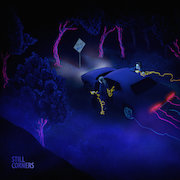Tessa Edwards of Still Corners had been reading a biography of the Beach Boys’ Brian Wilson while developing their latest album Dead Blue. It feels apropos, given the kinship between Brian’s artistic ideologies and the dream pop genre – be it the depictions of idylls, the impressionism, the desire to distort the codes of pop music, or the all around pleasantness of the final product. Dead Blue was written while renting a seaside house in Deal, Kent, where the band stared into the depths of the English Channel as they rehearsed – in some sort of undeliberate gesture of Beach Boys ideal.
But, as is known by most, Wilson’s sunlit compositions and assertions of “fun, fun, fun” were imitations of a reality that evaded him. In many accounts of interactions with him, he’s typically observed as a withdrawn guy – a mien that was only exacerbated over time by disabling family dynamics and his use of drugs. As was heavily publicised around the time of the collapse of SMiLE and the rise of Pet Sounds, the quasi-happy music of the Beach Boys derived from a purely destructive headspace. This is what Edwards found most compelling, and sought to impart upon Dead Blue: to channel negativity into something good. The Byronic hero is the focus of the album’s opener and first single, ‘Lost Boys’, in a kind of nebulous homage to the experiences of Wilson. Intentionally or not, it also features a very similar refrain on synth to another song dealing with the male angst: Bronski Beat’s ‘Smalltown Boy’. It’s a catchy song, sexy in its aloofness and synth-led nightclubbing aesthetic.
This sound marks the defining difference between Dead Blue and Still Corners’ more sentimental work, established on their debut album Remember Pepper? in 2007 and those that followed via Sub Pop (the new album is released via the band’s own Wrecking Light Records): founding member Greg Hughes was influenced and informed by sci-fi soundtracks around the time of producing Dead Blue. Notably, several contemporary soundtracks such as Ex Machina by Portishead’s Geoff Barrow and Ben Salisbury, and Beyond the Black Rainbow by Jeremy Schmidt; James Holden’s The Inheritors, which shares that same amorphous, foreboding sound, so psychopathically devoid of empathy, also played its part. These shine through in Dead Blue’s stylistic movement toward dark wave, embedded in the recursive lines of synth propelling each song. If only perhaps, the allusions were more developed: the sound doesn’t quite manage to create or replicate the enveloping atmosphere of its influences, perhaps because the mood shifts between melancholia and languidly upbeat between tracks, and is overall driven by melodies that feel ordinary and familiar. It makes for nice listening, but by no stretch is it challenging itself, the genre or the audience.
Notably set apart are the minimalistic interlude ‘Skimming’ and the track ‘Night Walk’ — the longest song, clocking in at six minutes, and by far the album’s most ambitious reimagining of synthpop. Full of scattered, discontinuous acts; an inorganic pocket of synth, moving into fey vocals, plummeting with heavy, swollen guitars, and then catapulted back into the throws of the dreamscapes they’ve accomplished so masterfully through previous work.
Much else, however, is take or leave. Songs like ‘Currents’ and ‘Downtown’ have neither the innate, speculative fascination of sci-fi, nor the rapturous haze of dream pop. Vocals on these tracks, too, are generally more enunciated and human, and it seems that all the instruments have lost their wanderlust for vaster space. If anything keeps Still Corners tied to a dream pop identity in Dead Blue, it’s that they are clearly aesthetes. Tessa’s overarching vocal performance is technically accomplished, and adds that same evocative, diaphanous appeal of Tamaryn, Grimes, Victoria Legrand of Beach House, Cocteau Twins’ Elizabeth Fraser. Layered with the glossy textures of the instrumentals, all playing melodies that can’t possibly startle or offend, the final effect of the whole album is very pretty. But, to paraphrase Immanuel Kant, as one must always try to do in an endeavour to sound as pretentious as possible, the beautiful is often original, surprising, a departure from the norm. On these terms, perhaps Dead Blue falls slightly short.


